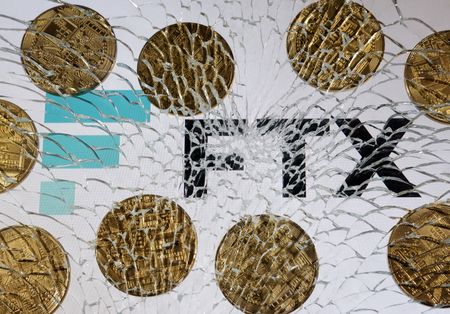 1
1 1
1

By Dietrich Knauth and Andrew Goudsward
(Reuters) -FTX told a U.S. judge on Friday that it has reached an agreement with the U.S. Department of Justice that removes one of the biggest obstacles to hiring its chosen legal advisers to navigate the collapsed crypto exchange’s bankruptcy.
FTX is asking U.S. Bankruptcy Judge John Dorsey at a hearing in Wilmington, Delaware, to sign off on its hiring Sullivan & Cromwell. The U.S. Trustee, the Justice Department’s bankruptcy watchdog, and two of FTX’s creditors had objected to the New York law firm, arguing that it had not disclosed sufficient information about its past ties to FTX.
These ties, they said, include the fact that FTX’s U.S. general counsel, Ryne Miller, is a former partner at the firm.
The U.S. Trustee and a Sullivan & Cromwell lawyer representing FTX told Dorsey that the firm and the exchange provided the Justice Department additional disclosures about the firm’s pre-bankruptcy work, which satisfied the department’s concerns.
Former top FTX attorney Daniel Friedberg had also opposed Sullivan & Cromwell’s hiring in court filings on Thursday, saying that the law firm had overbilled for legal work and had conflicts of interest stemming from its connections to Miller.
Miller tried to “channel a lot of business to S&C” and “looked forward to returning as a partner to S&C” after his stint at FTX, Friedberg wrote.
FTX creditor Warren Winter asked Dorsey to delay Sullivan & Cromwell’s approval until Friedberg’s allegations were investigated.
The judge denied the request, saying that Friedberg’s court filing was not properly presented to the court and “full of hearsay, innuendo, speculation and rumors.”
FTX has pushed back on the objections in court filings this week, saying it relies on Sullivan & Cromwell for high-stakes work like securing customer assets and sharing information with U.S. prosecutors and regulators.
FTX has said forcing it to find new lawyers would disrupt efforts to clean up the mess left behind by founder Sam Bankman-Fried, who has been accused by U.S. prosecutors of orchestrating an “epic” fraud that may have cost investors, customers and lenders billions of dollars.
Bankman-Fried, who has pleaded not guilty, has repeatedly attacked Sullivan & Cromwell since FTX’s implosion, claiming he was strong-armed by lawyers at the firm into filing for bankruptcy and surrendering control of the company. The firm called those allegations false in court filings this week.
Sullivan & Cromwell has told the court it should not be disqualified simply because it performed some pre-bankruptcy work for FTX. A Sullivan & Cromwell spokesperson has said the firm had a “limited and largely transactional” relationship with FTX prior to the bankruptcy and never served as primary outside counsel to any FTX entity.
FTX filed for bankruptcy protection in November, saying it was unable to completely repay customers who had deposited funds on its exchange. FTX’s new CEO, John Ray, has said his top priority is recovering assets to repay FTX customers.
Serving as primary bankruptcy counsel to FTX would likely allow Sullivan & Cromwell to reap hundreds of millions of dollars in fees, legal experts have said. FTX has sought bankruptcy court permission to pay top Sullivan & Cromwell attorneys more than $2,000 per hour.
Bankruptcy judges usually allow companies to choose their bankruptcy attorneys, but conflicts of interest can result in attorney disqualification in some rare cases.
(Reporting by Dietrich Knauth in New York and Andrew Goudsward in Washington D.C.Editing by Alexia Garamfalvi, Kim Coghill and Matthew Lewis)